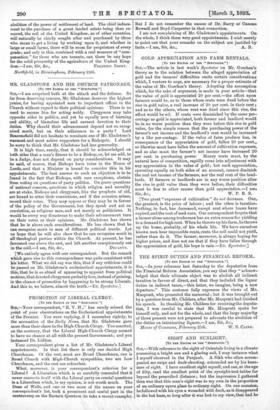GOLD APPRECIATION AND FARM RENTALS.
[To THE EDITOR or THIC " firEcrAroa.”1 SIN—The article in last week's Spectator on Mr. Goschen's theory as to the relation between the alleged appreciation of
gold and the farmers' difficulties omits certain considerations which, I venture to urge, are necessary for a proper estimate of" the value of Mr. Goschen's theory. Adopting the assumption which, for the sake of argument, is made in your article—that the value of gold is appreciated 20 per cent.—the effect upon farmers would be, as to those whose rents were fixed before the- rise in gold value, a real increase of 20 per cent. in their rent ;
and as to the others, whose rent was fixed since this rise, the- effect would be nil. If rents were diminished by the same per-
centage as gold is appreciated, both farmer and landlord would be in no worse position than they were before this rise in gold value, for the simple reason that the purchasing power of the farmer's net income and the landlord's rent would be increased by a like per-tentage. If the value of farm produce has, in consequence of the appreciation of gold, fallen 20 per cent.,.
so likewise must have fallen the amount of cultivation expenses, and so also must the farmer's net income have increased ar• per cent. in purchasing power. Money rents must, by the natural laws of competition, rapidly come into adjustment with any appreciation in the value of gold ; but such appreciation,. operating equally on both sides of an account, cannot diminish the real net income of the farmers, nor the real rent of the land- lords. If farmers or landlords are in any worse position after- the rise in gold value than they were before, their difficulties must be due to other causes than gold appreciation.—I
[Two great " expenses of cultivation" do not decrease. One,. the greatest, is the price of labour ; and the other is taxation-
Nothing, in fact, has decreased, except rent where leases have-- expired,and the cost of seed-corn. Our correspondent forgets that a farmer alone among tradesmen has an extra reason for yielding to a demand for high rent. When he throws up his farm, he throws up the home, probably, of his whole life. We have ourselves known men bear impossible rents, rents the soil could not yield,.
rather than do it. The farmer, moreover, is always hoping for higher prices, and does not see that if, they have fallen through the appreciation of gold, his hope is vain.—En. Spectator.]


































 Previous page
Previous page